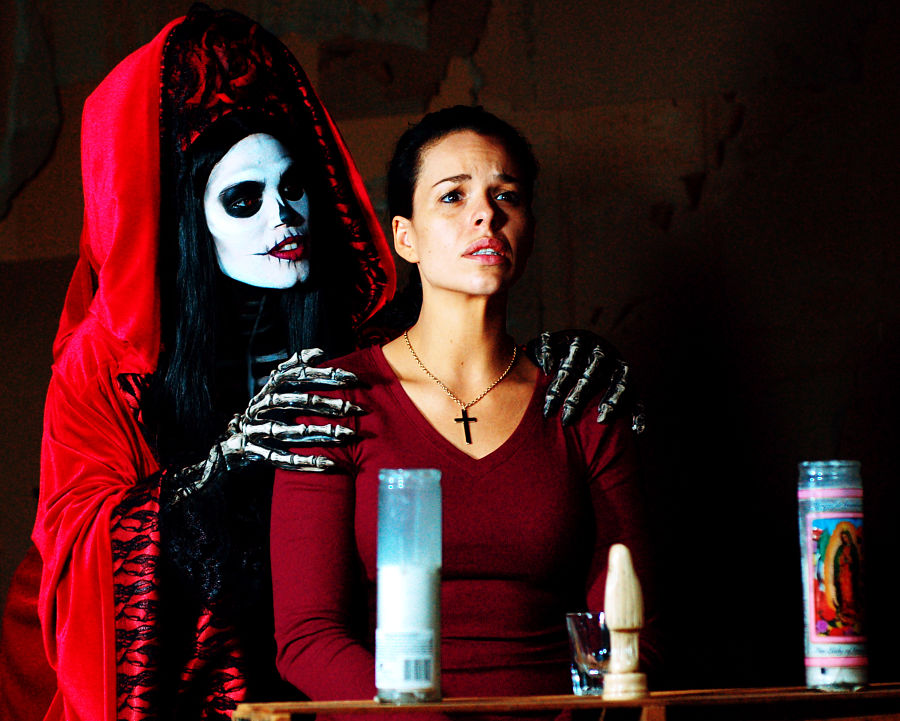There’s a place where women are disposable creatures. They disappear without a trace, usually with no repercussions or investigations. Their faces don’t grace milk cartons; their absence is as common as blue skies. The place is Mexico’s Ciudad Juarez. Once referred to as the “femicide capital” of the West, Juarez is a border town, a hotbed for prostitution, trafficking, and violence.
There is also place where the bodies reappear. That place is Lote Bravo, the setting for Hilary Bettis’s The Ghosts of Lote Bravo. Set in the Juarez slums, the play follows a mother’s search for her missing daughter. When local officials offer no assistance, she turns to the dark saint, La Santa Muerte (“Sacred Death”), for help.
“It’s really about questioning religion and the economic systems that we create that put people into extreme poverty and extreme violence,” Bettis explains. She notes that there was a spike in these disappearances after NAFTA-approved factories moved into the city, creating cheap-labor jobs for goods to be sold in America. Many women work in these factories and in the sex trade to provide for their families. “I think this is a play that scares a lot of people,” Bettis adds. “It’s violent and relentless and it deals with sexuality, and it’s unapologetic about all of these things.”
Lote Bravo is receiving a National New Play Network rolling world premiere, a program that supports three or more theatres that choose to mount the same new work within a one-year period. Lote Bravo will receive three productions: Borderlands Theater (April 14–May 1), Unicorn Theatre (April 20–May 8), and Cleveland Public Theatre (March 2017).
The play is personal for Bettis. The granddaughter of a Mexican immigrant, she remembers when she felt stuck between her ethnicities and questioned where she belonged. “You recognize the privilege and the oppression at the same time and realize that you’re a combination of these things,” she says. “What can I honestly claim? Do I belong to any of them? Can I unapologetically claim all of them?”
One thing that helped bridge that gap was a grant secured from the NNPN Collaboration Fund, which supports translating the script into Spanish and a workshop in Mexico City in partnership with El Círculo Teatral.
“Cleveland Public Theatre expressed an interest in doing the play in Spanish in 2017; we didn’t have a translation,” says Ian Crawford, Unicorn’s director of development, who is helming the production. So Bettis, Crawford, Unicorn artistic director Cynthia Levin, Borderlands artistic director Barclay Goldsmith, and members of the Cleveland Public Theatre spent a week exploring the city and collaborating. “This was an opportunity for all three companies and Hilary to go immerse ourselves and conduct research,” Crawford continues. “Especially with the character La Santa Muerte. It was totally formative for all of us understanding what that character represents.”
Bringing the Juarez barrios to Midwestern stages wasn’t without some challenges, though. The biggest challenge was casting. While Kansas City, where Unicorn is based, boasts a large Latino community, the Latino acting pool is considerably smaller.
“It was hard,” says Crawford. “Hilary’s written this incredibly demanding play. It took a long time and we looked at a lot of people we haven’t seen before. They’re all Kansas City actors.”
“This was at the same time that conversation about representation onstage was at its height,” adds Bettis. “It was a big conversation that was happening, and we were all acutely aware of it. If you’re going to tell this story right, you can’t do it with white actors.”
When Lote Bravo opens this weekend in Kansas City, it will be in front of an audience far removed from the experiences of the people in Juarez. “I hope they learn a lot about conditions in Juarez they wouldn’t know before and they start to see these situations in a different light,” Crawford says. “Theatre is an incredible mirror to our world, and it’s a way for us to better understand the issues of our day.”
And Bettis, who will be in the audience for the Unicorn opening, thinks that the very specific story can be universal. “That plight for a better life is something everyone can relate too,” she says.


